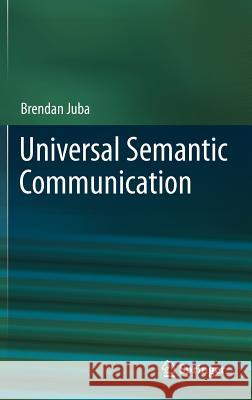Universal Semantic Communication » książka
Universal Semantic Communication
ISBN-13: 9783642232961 / Angielski / Twarda / 2011 / 400 str.
Universal Semantic Communication
ISBN-13: 9783642232961 / Angielski / Twarda / 2011 / 400 str.
(netto: 383,36 VAT: 5%)
Najniższa cena z 30 dni: 385,52
ok. 16-18 dni roboczych.
Darmowa dostawa!
Is meaningful communication possible between two intelligent parties who share no common language or background? In this work, a theoretical framework is proposed in which it is possible to address when and to what extent such semantic communication is possible: such problems can be rigorously addressed by explicitly focusing on the goals of the communication. Under this framework, it is possible to show that for many goals, communication without any common language or background is possible using universal protocols. This work should be accessible to anyone with an undergraduate-level knowledge of the theory of computation. The theoretical framework presented here is of interest to anyone wishing to design systems with flexible interfaces, either among computers or between computers and their users.
Is meaningful communication possible between two intelligent parties who share no common language or background? In this work, a theoretical framework is proposed in which it is possible to address when and to what extent such semantic communication is possible: such problems can be rigorously addressed by explicitly focusing on the goals of the communication. Under this framework, it is possible to show that for many goals, communication without any common language or background is possible using universal protocols.§The theory developed here introduces formal notions of feedback that capture the essence of whether or not reliable universal protocols can be constructed in many natural settings of interest. In particular, the utility of these notions is illustrated by the development of protocols for universal delegation of computation from a space-efficient client to a general-purpose server, and the development of a variant of TCP that allows end-users on a packet network to automatically adapt to small changes in the packet format (e.g., changes in IP). These examples allude to the main motivation for considering such problems, which is to develop techniques for modeling and constructing computer systems that do not require that their components strictly adhere to protocols. In addition, the work features interesting connections to cryptography, computational learning theory, and a theoretical version of the problem of designing usable interfaces in human-computer interaction.§This work should be accessible to anyone with an undergraduate-level knowledge of the theory of computation. The theoretical framework presented here is of interest to anyone wishing to design systems with flexible interfaces, either among computers or between computers and their users.











